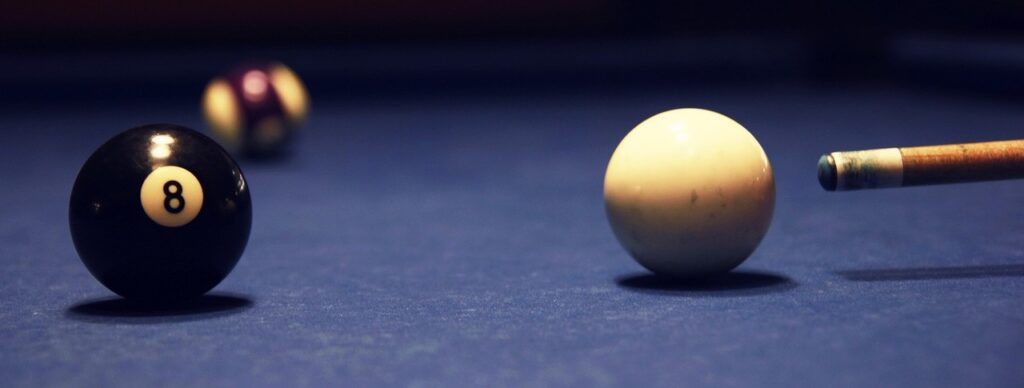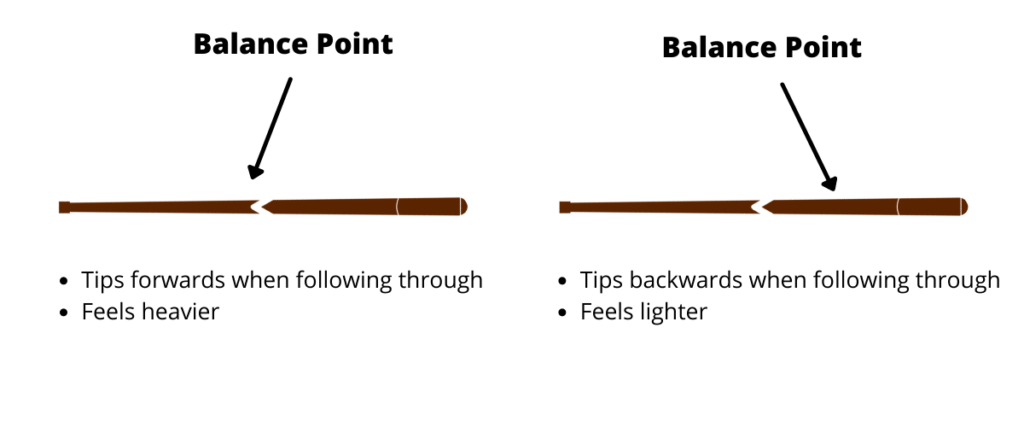Choosing the weight of your cue is an important decision. Whether you play pool or snooker, you need to choose a cue which is the correct weight for you. In this article, I’ll explain how the weight of the cue influences your playing and how much they weigh on average.
Does Cue Weight Matter?
The weight of a pool or snooker cue impacts the level of effort you need to exert to achieve a certain amount of power, and the level of control you have over the cue. Some players find heavier cues more stable and hence more accurate, whilst others find lighter cues easier to hold and add spin.
The best thing to do is to try a variety of cue weights. That’s why I’d always recommend trying a cue out in the store if it’s possible. This way you can get to grips with the different weights and see which best suits you. The best cue weight will be the one that’s the most comfortable for you, as it will allow you to play to your best ability.

Speed and Power
The speed at which the cue ball travels is mainly dictated by your arm movement, and how fast your stroke is along with you draw and your follow through. However, the weight of the cue will still make a difference. Heavier cues will generate more powerful (and faster) shots will less effort compared to lighter cues, if the stroke is the exact same.
But that’s where the caveat comes in. A heavier cue can make some player’s strokes softer and slower, and actually result in less power and speed compared to a lighter cue. That’s why the weight is such a personal preference and really depends on your technique.
Finesse
The extra power that the heavier cue results in can be a detriment if you want to hit the cue ball very lightly. Soft and delicate shots are easier with lighter cues. Lighter cues also make it easier for some players to generate spin because it’s easier to accelerate the cue towards the cue ball and follow through to increase the cue’s contact time with the ball.
Stability
Players who prefer heavier cues usually comment that they feel more stable as the extra weight gives them a more consistent stroke compared to a lighter cue which feels more difficult to control. Again, this is a personal preference and most players will find that a particular weight gives them the right balance.
It’s often said that heavier cues can be more forgiving. For example, if you have poorer form, for example your wrist slips and twists when you are hitting the cue ball, a heavier cue may be better as it is more likely to still travel in a straight line due to the added weight.

Heavy vs Light Cues
Heavy cues allow you to generate more power with less effort compared to lighter cues. Heavier cues are also easier to keep straight throughout the stroke so are more forgiving compared to lighter cues which highlight technique flaws more. However, lighter cues can allow you to generate more spin.
| Heavy Cue | Light Cue |
| Results in slower arm movement | Allows you to move your arm faster |
| More speed is generated with less effort | More effort is required to generate speed |
| More forgiving (easier to keep straight) | Less forgiving (highlights technique flaws) |
| Harder to generate spin | Easier to generate spin |
What weight cue is best for beginners?
Beginners will usually find that an 18-19 oz. cue is a suitable weight. This is considered a mid-range in terms of the average cue weight and will allow you to learn good technique and maintain accuracy and control over the cue ball.
Do you need a heavier cue for breaking?
Some players prefer a heavy cue for breaking because it feels more stable and allows them to generate more speed when using a slower stroke. However, some players prefer a lighter cue for breaking because it allows them to move their arm faster to generate more speed with the cue ball.
Weight Balance is Important
Here’s we’re talking about the balance point of the cue. This is the point at which the cue has an even distribution of weight on either side.
When you follow through with your cue, it will naturally tilt downwards. The balance point will affect how much the cue tips. If you have a balance point closer to the tip, it’ll tilt downwards more than if the balance point is closer to the back of the cue.
It’s vital that you don’t just consider the overall weight of the cue, but how the weight is distributed. An 18 oz. cue which has the weight focused more towards the tip can act like a heavier cue compared to a 20 oz. cue which has more weight focused towards the back.

How Much Do Cues Weigh?
There are three main types of cue:
- American Pool
- English Pool
- Snooker
American Pool Cue Weight
Full-size American pool cues (57″-58″) usually weigh between 16 oz. and 21 oz (0.45-0.60 kg). A cue that weighs 16-17 oz. is considered fairly light, and a cue which weighs over 19 oz. is considered quite heavy. Here are some examples.
| Cue | Size and Type | Weight (Imperial) | Weight (Metric) |
| Powerglide Burner | 57”, Two Piece | 16-19 oz. | 0.45-0.54 kg |
| MacMorran Lincoln | 57”, Two Piece | 17 oz | 0.48 kg |
| McDermott Mahogany G-Series | 58”, Two Piece | 19.5 oz. | 0.55 kg |
| Powerglide Professional President | 57”, Two Piece | 20 oz. | 0.57 kg |
English Pool Cue Weight
Full-size English pool cues (57″) usually weigh between 16 oz. and 20 oz. (0.45-0.57 kg). Junior-sized 36″ cues weigh roughly 10-12 oz., 42″ cues weigh approximately 14-16 oz., and 48″ cues weigh around 15-17 oz.
A cue that weighs 16 oz. or less is considered fairly light, and a cue which weighs over 18 oz. is considered quite heavy. Here are some examples.
| Cue | Size and Type | Weight (Imperial) | Weight (Metric) |
| Kudus One Piece | 36”, One Piece | 10-12 oz. | 0.28-0.34 kg |
| Baize Master Silver Series | 42”, Two Piece | 14-16 oz. | 0.40-0.45 kg |
| Kudos One Piece | 48”, One Piece | 15-17 oz. | 0.43-0.48 kg |
| Baize Master Silver Series | 52”, Two Piece | 15-17 oz. | 0.43-0.48 kg |
| Jonny 8 Ball | 52”, Two Piece | 16-18 oz. | 0.45-0.52 kg |
| Kudos SE20 | 57”, Two Piece | 17-18 oz. | 0.48-0.51 kg |
| Spartan Fury Vanquish | 57”, ¾ Jointed | 18-19 oz. | 0.51-0.54 kg |
| Britannia ¾ Pro 8 Ball | 57”, ¾ Jointed | 17.5-20 oz. | 0.50-0.57 kg |
Snooker
Full-size snooker cues (57″-58″) usually weigh between 17 oz. and 20 oz (0.48-0.57 kg). A cue that weighs 17 oz. or less is considered fairly light, and a cue which weighs over 19 oz. is considered quite heavy. Here are some examples.
| Cue | Size and Type | Weight (Imperial) | Weight (Metric) |
| Peradon Derby | 58”, Two Piece | 17 oz. | 0.48 kg |
| Cannon Spirit | 57”, Two Piece | 17 oz. | 0.48 kg |
| BCE Mark Shelby | 57”, Two Piece | 17-18 oz. | 0.48-0.51 kg |
| Cue Craft Triumph TR6 | 58”, Two Piece | 17.5-19.5 oz. | 0.50-0.55 kg |
Check out this article comparing pool and snooker cues.
How To Adjust the Weight of a Cue
Heavier cues have weights inside which can be removed to lighten the overall weight. The weights are located in the butt of the cue so you can remove the butt and the weights inside. Check out the video below to see the process.
You can make a lighter cue heavier by adding an extension, however keep in mind that this will make it more difficult to play in tighter areas.
The size of a cue tip impacts several aspects of its performance? Check out my comparison between different cue tip sizes to learn more.
Here are some more articles you might find useful: